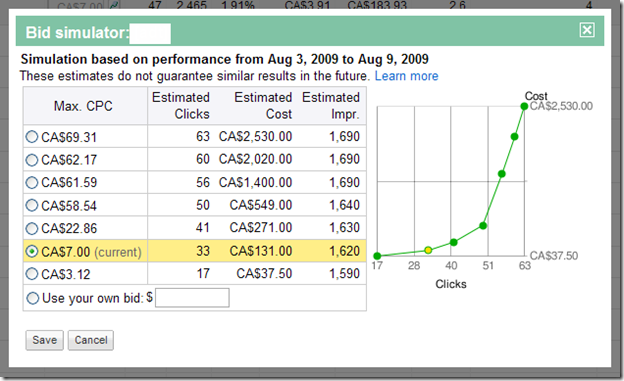 Trudging around the various SEM forums on the Internet, I'm getting a feeling from other PPC marketers about the new Google AdWords Bid Simulator similar to my own. And it's not good.
Trudging around the various SEM forums on the Internet, I'm getting a feeling from other PPC marketers about the new Google AdWords Bid Simulator similar to my own. And it's not good.
The AdWords Bid Simulator was released in order to help pay per click advertisers rank better in Google search results, and have their ads appear for as many impressions as possible. This was the basic premise behind the tool. In my mind, it was moved out of beta before it was ready.
The prices recommended are incredibly high, and are giving other users the impression that Google created this tool to take advantage of the 'rookies' and other irregular users of Google AdWords. Making advertisers bid high per click prices in order to simply make more money off of their clicks hence, not encouraging the creation of highly optimized campaigns.
I mentioned in a previous post that the premise behind Google Bid Simulator made sense. It creates income for them through the Google Adwords advertising platform. But the 'recommended bid prices' are incredibly high and seem way out of whack with reality.
Seeing The Flawed Bid Simulator Tool In Action
Let's look at a keyword in one of our accounts. One that consistently ranks high in Google's PPC search results.
This word has an average position of 2.6 and has converted 4 times this month for a fantastic conversion rate of 8.51%.
If you look on the far left hand side you will see the small Bid Simulator icon beside the default CPC bid price. Clicking on the button brings up the Bid Simulator window and bid recommendations for this keyword.
Here's where I get a little wary of the tool. We have already accrued 47 clicks this month on this keyword, but the Bid Simulator tool is recommending I up my Max CPC bid price to an incredible $22.86 per click in order to receive 41 clicks.
Huh?
Now, I realize that I only managed a 58% in Grade 12 math, but that's more related to the fact that I just hated math. But even I'm not going to be fooled into bidding 22 dollars for 6 fewer clicks than I'm receiving with my current bid price of $7.00. On top of that, my actual cost per click is only $3.91 this month for this keyword! Why on earth would I want to blow through my client's budget for 10 more impressions and 8 more clicks? I'm not sure the daily budget could even accommodate an increase like that.
Assuming that such a difference probably won't result in additional conversions over a similar period, adding an 'estimated' $140.00 to the keyword each week means I would now have a CPA of $67.75 instead of the $45.98 I now have. That's an increase of just over 47%. I'll keep my 46 dollar CPA - thank you not so much.
The Max CPC bid prices presented by the tool above are staggering. Given the increases in impressions and clicks it also gives.
As previously mentioned at the outset of this article, I'm not the only one making these observations. The keyword used for this example is not an anomaly amongst every keyword we've used for other clients. It occurs quite regularly from keyword to keyword.
One hopes that Google is working on something a little more realistic when it comes to the Bid Simulator recommendations.
The Google Bid Simulator Is Not For Dummies
The premise of the Google Bid Simulator is good. Maybe there is something I am overlooking in the application of this tool. But the main point is that if a Pay Per Click manager, who is using this tool every single day cannot grasp the application of this tool then how in the world will a novice?
Kudo's to Google for trying and perhaps they will improve the functionality of the tool.
For now, I'll continue to trust my own judgement based on the data presented in my Google AdWords accounts.








on
I don’t think even professional advertisers will use this tool. Not now, at least. The odd beginner might use it if they are unaware, but your seasoned marketing professionals will recognize the flaws and avoid the tool until it appears to work in a much more realistic fashion.
on
I think only a limited number of advertisers will use the bid simulator. If they failed to make this transparent, then this major revenue stream going to put Google’s Q4 in peril. And Google knows this better than you and me 🙂
on
I should add that I have seen these outrageous bid recommendations on many different client accts. It is not just a few keywords here and there.
on
I could not agree more Matt with everything you said. I believe this a blatant attempt by Google to bring in more revenue by taking advantage of inexperienced PPC advertisers.
To Alfonso,
I think you are the one that is misunderstanding. Explain this one for me…..I have a client who bids on a high traffic/ low competition term (there is literally only one other advertiser) Their average position is 1.1. They have been consistently bidding around 2.07 for a term, Google recommended increasing this bid to 6.47 for 10 more impressions!! There is no justifying that increase….it does not make financial sense, nor would it even increase traffic because they almost always appear at the top pos.
on
From how I read your post, Alfonso, it seems like you have said the same thing between should and have to in terms of bidding.
In either case, though, I stand by the assertion that it’s inaccurate. I have previously acquired 47 clicks for much less per click on a much lower Max CPC bid price. Why would I change my Max CPC bid price now? The optimization work done on this account means I can bid lower and pay lower than what the Simulator is recommending.
The Simulator appears to be grabbing numbers out of the air, as no one would pay more for fewer clicks.
on
Matt, I think you are fundamentally misunderstanding the bid figures in the left-hand column of the bid simulator. These are not ‘recommended’ bids. They are merely ‘what if’ values.
So, if you are bidding $7.00 and the next value up in the chart reads $22.86 to receive 41 clicks, that does not mean that you should bid $22.86 to get 41 clicks, but rather, that you would have to bid $22.86 to get 41 clicks.
In other words, it’s up to you to determine what the best bid is for you. The Bid Simulator simply estimates traffic levels at various bids, without judging which of those bids is the best.